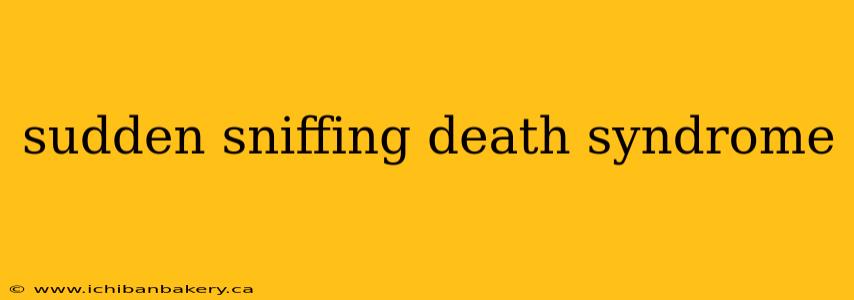Sudden sniffing death syndrome (SSDS) is a rare but potentially fatal condition. It's characterized by the sudden death of a young, seemingly healthy individual. This death often occurs during or shortly after inhaling volatile substances, such as inhalants. Understanding the risks associated with inhalant abuse is crucial for prevention.
What is Sudden Sniffing Death Syndrome?
Sudden sniffing death syndrome (SSDS) is a tragic and often unexpected event. It involves the sudden cardiac arrest of a person, typically a young adult, who has been inhaling volatile substances. These substances can include common household products like aerosol sprays, solvents, and gases. The exact mechanism of death isn't fully understood, but it's believed to involve a combination of factors impacting the heart's rhythm.
The Dangers of Inhalant Abuse
Inhalant abuse is a significant public health concern, especially among teenagers and young adults. The readily available nature of many inhalants makes them easily accessible. However, the consequences of inhalant abuse can be devastating, ranging from short-term effects like dizziness and hallucinations to long-term damage to the brain, heart, and other organs. SSDS represents the most extreme consequence.
Mechanisms Behind SSDS: A Complex Interaction
Several factors contribute to the occurrence of SSDS. The volatile substances themselves can directly affect the heart's electrical system. This can lead to dangerous arrhythmias, which disrupt the heart's normal rhythm. Simultaneously, the stress placed on the heart from inhalant abuse, combined with other potential underlying health conditions, can exacerbate the risk.
Key Factors Contributing to SSDS
- Cardiac sensitization: Many inhalants sensitize the heart to the effects of adrenaline (epinephrine). Even a small amount of adrenaline release, triggered by a minor stressor, can trigger a fatal arrhythmia in a sensitized heart.
- Electrolyte imbalances: Inhalant abuse can disrupt the delicate balance of electrolytes in the body. These imbalances can significantly affect the heart's ability to function properly.
- Underlying heart conditions: Pre-existing heart conditions, even undiagnosed ones, can dramatically increase the risk of SSDS.
- Physical exertion: Combining inhalant use with physical activity further increases the stress on the heart, significantly raising the risk of cardiac arrest.
Recognizing the Signs of Inhalant Abuse
Early intervention is crucial in preventing tragic outcomes like SSDS. Recognizing the signs of inhalant abuse is the first step. These signs can be subtle or obvious, depending on the individual and the frequency of use.
Common Signs of Inhalant Abuse:
- Sudden changes in behavior: Mood swings, irritability, or unusual lethargy.
- Physical symptoms: Dizziness, slurred speech, loss of coordination, nausea, or vomiting.
- Chemical odors: The presence of unusual chemical odors on breath, clothing, or belongings.
- Changes in appearance: Red or watery eyes, runny nose, or unexplained bruises.
- Hidden paraphernalia: Empty aerosol cans, solvent containers, or other inhalant-related materials hidden away.
Preventing Sudden Sniffing Death Syndrome
Prevention is paramount in addressing SSDS. Education plays a crucial role in informing young people about the dangers of inhalant abuse and the potentially fatal consequences like SSDS.
Strategies for Prevention:
- Education and awareness campaigns: Schools, communities, and families should actively educate young people about the risks associated with inhalant abuse.
- Parental involvement: Parents should monitor their children's behavior and be vigilant in detecting any signs of inhalant abuse. Open communication is key.
- Access control: Limiting access to common household inhalants can help reduce the temptation to abuse them.
- Seeking professional help: If you suspect someone is abusing inhalants, seek professional help immediately. Early intervention is critical.
Seeking Help and Support
If you or someone you know is struggling with inhalant abuse, it's vital to seek help immediately. There are resources available to support individuals and families dealing with this challenging issue. Contact your doctor, a local health clinic, or a substance abuse treatment center. Early intervention can save lives and prevent tragic outcomes like SSDS.
Disclaimer: This article provides general information about Sudden Sniffing Death Syndrome and should not be considered medical advice. Always consult with a healthcare professional for any health concerns or before making any decisions related to your health or treatment.
